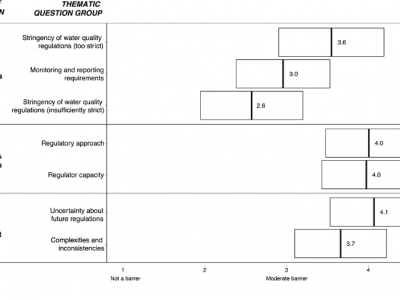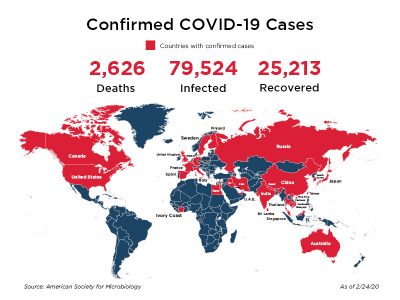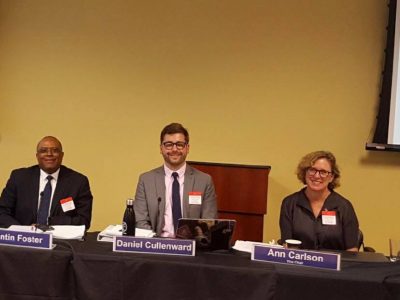Regulatory Policy
Understanding wastewater utility views on innovation and regulation
by Luke Sherman, Alida Cantor, Anita Milman, and Michael Kiparsky
The same underlying technology has been used in the municipal wastewater sector for 100 years. New technologies that treat effluent more efficiently and effectively exist, yet deployment of those technologies has been slow. The limited adoption of new technologies in the wastewater sector raises questions about how to encourage innovation. Popular narratives around innovation sometimes …
Continue reading “Understanding wastewater utility views on innovation and regulation”
CONTINUE READINGRisk, Uncertainty, and COVID-19
What do we actually know at this point about the dangers?
Like many environmental hazards such as toxic chemicals, the coronavirus is fundamentally a problem in risk management. And like issues such as climate change, the problem involves scientific data, modeling, and a good deal of uncertainty. With climate change, the key parameter is climate sensitivity. For diseases the key parameter is called R0, which measures …
Continue reading “Risk, Uncertainty, and COVID-19”
CONTINUE READINGVirus Denial
Yet another effort to ignore reality, from the usual players.
We’ve seen this movie before. Scientists warn of a serious threat. But in Trump World, the problem doesn’t exist. It’s just a product of alarmism. First, climate change. Now, the coronavirus, COVID-19. Trump himself has worked hard to minimize the problem. “We have very few people with it,” he said, and ” people are getting …
Continue reading “Virus Denial”
CONTINUE READINGAnother Problem with Cost-Benefit Analysis of Climate Policy
It’s hard to estimate benefits. But it turns out costs are also uncertain.
It’s common knowledge— at least, among people who follow these things — that it is hard to estimate the benefits of a proposed climate policy. But it’s actually quite difficult to estimate the costs as well. There are three major problems in estimating the benefits of a proposed climate policy. First, it’s hard to estimate …
Continue reading “Another Problem with Cost-Benefit Analysis of Climate Policy”
CONTINUE READINGFrom the Grand Canyon to Contaminated Cantaloupes – and More
Five books with fresh perspectives on environmental issues.
Law reviews make little effort to track new books, unlike other journals in other disciplines . So it’s pretty much hit-or-miss whether you learn about relevant new books. I wanted to share some interesting finds that have crossed my desk, joined a growing pile of unread books, and then slowly left the pile. The subjects …
Continue reading “From the Grand Canyon to Contaminated Cantaloupes – and More”
CONTINUE READINGCharging Consumers for Imaginary Power Needs
FERC is distorting energy markets in the name of perfect competition.
Last year, the GOP majority on FERC decided that state clean energy policies were distorting energy markets in the country’s largest grid region. Because they provided incentives for power producers, FERC ruled, those policies should be considered subsidies. It directed grid operators to introduce new policies to counter those subsidies and halt the dreadful onslaught …
Continue reading “Charging Consumers for Imaginary Power Needs”
CONTINUE READINGClimate Change and the Financial Industry
How is one of the world’s largest industries responding to climate change?
As of 2018, the U.S. financial industry contributed $1.5 trillion to GDP. How is the financial sector responding to climate change? The short answer is “slowly so far, but there are signs of progress.” For instance, just last Friday, the NY Times reported that European Central Bank began a strategy review with climate change on …
Continue reading “Climate Change and the Financial Industry”
CONTINUE READINGPricing Carbon: What Does It Actually Accomplish?
Pricing carbon may not work the way economists thought.
In theory, pricing carbon should incentivize emissions reductions. In reality, it is unclear to what extent that takes place unless the carbon price is very high. This is not to say that pricing carbon is useless, but the main benefits may take different forms. Basically, there are two ways of putting a price on carbon. …
Continue reading “Pricing Carbon: What Does It Actually Accomplish?”
CONTINUE READINGNew California Report on State Climate Policies Released
Independent Emissions Market Advisory Committee Recommends Focus on Transportation, Affordability, Allowance Banking, Allowance Supply and the Effects of Overlapping Policies in the Regional Electricity Market
The California Independent Emissions Market Advisory Committee released its annual report yesterday making recommendations about California climate policy. I serve as the Vice Chair of the committee and as the Speaker of the Assembly’s appointee. Our report makes five recommendations: that the state focus on the affordability of its carbon policies, with special concern about …
Continue reading “New California Report on State Climate Policies Released”
CONTINUE READINGPride Goeth Before a Fall
Trump thinks he can tell courts how to interpret NEPA. He’s wrong.
White House has just released its proposed revisions to the rules about environmental impact statements. The White House Council on Environmental Quality (CEQ) simply does not have the kind of power that it is trying to arrogate to itself. The proposal is marked by hubris about the government’s ability to control how the courts apply the …
Continue reading “Pride Goeth Before a Fall”
CONTINUE READING












